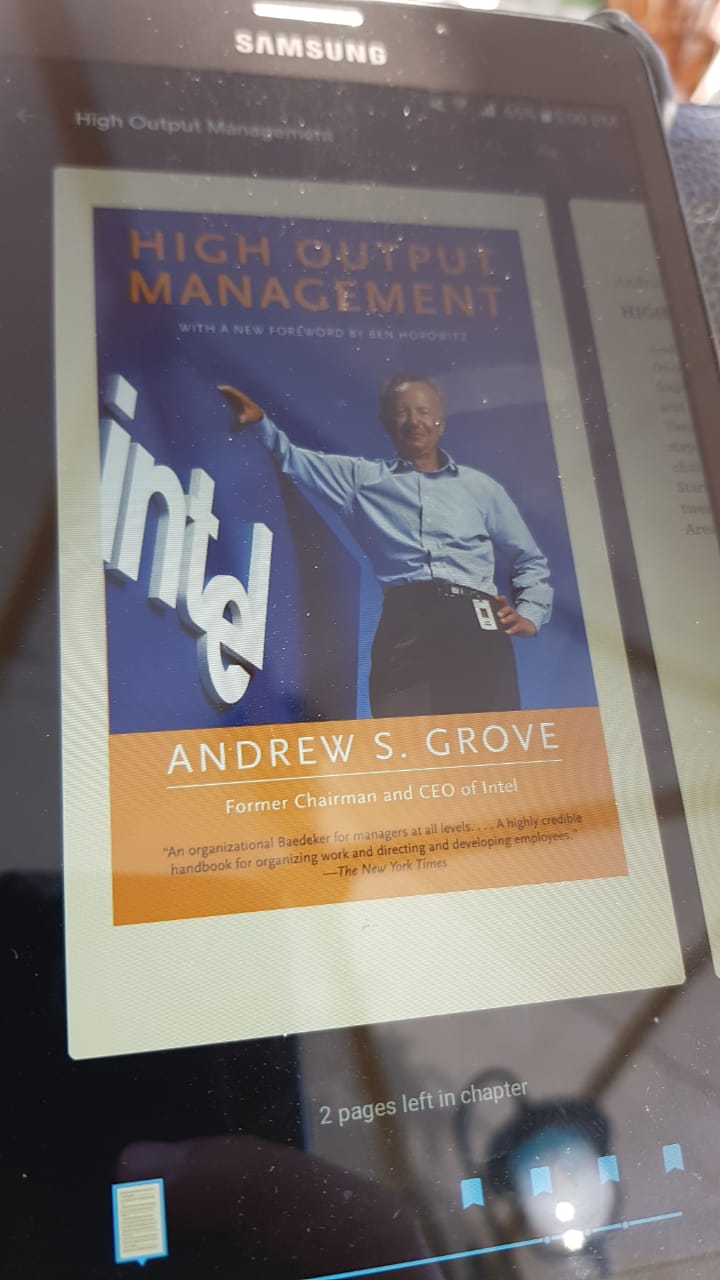anyway, ini buku "high-level" ke sekian yang saya baca, sama kaya judulnya ya.. Buku ini emang berat. Saya bersyukur udah lulus MBA, jd baca buku ini lumayan nyambung. Ga kebayang waktu sblm MBA kalau dijejelin buku ini pasti banyak bengongnya.
Buku ini dibilang buku terbaik yang pernah dibaca oleh Ben Horowitz, yang dia mention di buku ini: The Hard Thing About Hard Things, Building a Business When There Are No Easy Answers
ya intinya buku ini buku berat, sangat worth untuk dibaca, dan perlu pengalaman dan ilmu khusus supaya ngerti.
 |
| Buku High Output Management |
ok kita konteks bukunya ya...
Intinya buku ini ngasih tau gimana supaya seorang manager bisa memberikan output tinggi untuk perusahaan. Output dari manager = output perusahaan + output organisasi sekelilingnya.
Duh saya juga kurang bisa menyelami rumus itu, masih perlu direnung2i lagi.
Yang paling ngena dan saya fahami, cara untuk meningkatkan ouput seorang manager itu dengan meningkatkan kapasitas bawahannya. Meningkatkan kapasitas bawahan itu hanya 2 cara, yaitu ngasih motivasi dan ngasih training, udah hanya itu aja.
Soal motivasi, ini agak bertolak belakang dengan buku buku modern management yang saya baca, katanya sih kalau perusahaan mau melejit, harus punya karyawan yang self-motivated, kalau manager kerjaannya nge-motivasi karyawan, perusahaan bisa lambat. katanya gitu. Saya sih lebih mempraktekkan yang ke-dua ini, kalau ada karyawan malas2an ga punya motivasi, mending pecat aja. simple kan? hehe
Kalau training, nah ini saya baru tersadarkan. Selama ini saya jarang ngasih training ke karyawan, di buku ini bilang yang ngasih training itu harus dari manajer, bukan dari instansi di luar perusahaan. Manager harus ngajarin gimana kerja yang baik, gimana menggunakan software supaya efisien, gimana ngitung ini, ngitung itu. Penulis bilang, manajer wajib meluangkan waktu untuk training bawahannya, meskipun penambahan skill hanya 1%, bayangin penambahan ini kalau diakumuasikan dalam 1 tahun? wah iya juga saya pikir. Dengan baca ini saya langsung merencanakan untuk basic training untuk karyawan saya, dari hal hal yang basic seperti penggunaan M. Excel, penggunaan Google Sheet, penggunaan Google Chrome, dan lain sebagainya...
ini beberapa highlight pribadi saya tentang buku ini, silahkan tafsir sendiri.. hehe
- When products and service become largely indistinguishable from each other, all there is by the way of competitive advantage is time.
- it is vitally important to reject defective material at a stage where its accumulated value is at the lowest possible level.
- Writing the report is important; reading it often is not.
- But the negative leverage produced by depression and waffling is very hard to counter because their impact on an organization is both so pervasive and do elusive.
- For me, paying close attention to customer complaints constitutes a high-leverage activity.
- delegation without follow-through is abdication. You can never wash your hands of a task.
- we should apply quality assurance principles and monitor at the lowest-added-value stage of the process. For example, review rough drafts of reports that you have delegated; don't wait until your subordinates have spent time polishing them into final form before you find out that you have a basic problem with the content.
- If he answers them convincingly, we'll approve what he wants. This technique allows us to find out how good the thinking is without having to go trough it ourselves.
- The most common problem cited was uncontrolled interruptions, which in remarkably uniform fashion affected both supervisory and know-how managers.
- But there is an enormous difference between a casual encounter by supervisor and subordinate, or even a meeting (mission-oriented) to resolve a specific problem, and a one-on-one.
- on one-on-one meeting --> ask one more question! when the supervisor thinks the subordinate has said all he wants to about a subject, he should ask another question. He should try to keep the flow of thoughts coming by prompting the subordinate with queries until both feel satisfied that they have gotten to the bottom of a problem.
- One of the distinguish marks of a good meeting is that the audience participates by asking questions and making comments
- But today's gap represents a failure of planning sometime in the past.
- If you don't know where you're going, you will not get there
- Good management rests on reconciliation of centralization and decentralization
- It is our task as managers to identify which mode of control is most appropriate.
- I'll say again that a manager's most important responsibility is to elicit top performance of his subordinates.
- The fundamental variable that determines the effective management style is the task-relevant maturity of the subordinate
- The biggest problem with most reviews is that we don't usually define what it is web want from our subordinates
- The purpose of the review is not to cleanse your system of all the truths you may have observed about your subordinate, but to improve his performace
- when interviewing talk-active person --> you should interrupt and stop him, because if you don't, you are wasting your only asset - the interview time
- by increasing motivation, the desire of each person to do his job well, and by increasing individual capability, which is where training comes in.
- Training needs to be a continiuing process rather than a one-time event
Ya sekian aja review saya ini, semoga bermanfaat.


0 Response to "Review Buku: High Output Management - Andrew S. Grove"
Posting Komentar